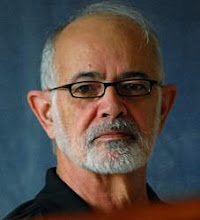What
we need is not more democracy, but better democracy.
Patrick
J. Deneen
Nuts, In A Shell: The Turks are afraid of the Kurds. The Sunni regimes of Saudia Arabia, Turkey, Qatar, Kuwait and the UAE are more frightened of Shiite Iran than they are of the jihadists of the Islamic State. Iraq isn't actually a country and never was. Egypt is trying to draw attention to the breakdown in Libya (and the Egyptian military is too busy controlling its own population to do much else). Only the US – for its own internal political and economic reasons – sees an up-side to half-heartedly 'doing something', although what it has tried to 'do' in Muslim areas in the last decade hasn't worked out too well. Which brings us up to date.
Smoke and Mirrors: If oil is what gives Scotland's independence movement its leverage, it's a damned short lever.
Corpus Delicti: The Fed reports that US industrial production declined 0.1% last month and manufacturing output fell 0.4%. These were the first declines in either index this year (but the July data for both was also revised downward.) The biggest drop was in auto production (down 7.6%) which raises questions about the continuing strength of the sub-prime car-loan driven 'renaissance'.
Perspective: The soaring S&P 500 is masking the real state of the real markets. Over 45% of Nasdaq Composite stocks are down 20% or more, same for the Russell 2000.
Crudely Speaking: Industry data from some 65,000 fracked oil and gas wells, makes it clear that this is not a sustainable long-term technique. Production from fracked wells makes a declining hyperbolic curve, falling about 70% the first year, nearly 40% more the second and 30% in the third, for an overall 3-year decline of about 85%. Because the 'sweet spots' get drilled first and because the source formations are geographically limited, domestic production will begin dropping within a few years even as ever more wells are drilled – running faster and faster and losing ground. In the long term, fracking is a short term thing.
The Lower Down: The OECD now forecasts the U.S. would grow by 2.1% this year, down from the 2.6% guestimate in May. The euro area GDP was downgraded May's 1.2% to 0.8%. But it's still 'the recovery' marches on. They say.
See Change: Home sales in the pricer parts of CA – which are the same areas where most of the people live, of course - are “collapsing.” Perhaps the 90% of the 25-34 year age group who do not own a home and do not plan to ever buy one has something to do with it. These prime first-home buyers do not represent any “pent-up demand”. Price has a lot to do with it, so does experience – the experience of their parents, which was not lost on them.
Peace In Our Time: The US has started over 80% of the armed conflicts in the world since World War Two (201 of 248). US-instigated conflicts have killed at least 30 million people, 90% of them non-combatants.
Voice of Dissent: Bernie Sanders, once again demonstrating that he just doesn't get it, says that American soldiers didn’t die “so billionaires could buy elections”. That's a good one!
Porn O'Graph: The Party's Over, North Sea/Scottish Independence edition.

2 comments:
Real Estate collapse of high price residences in CA probably has more to do with China clamping down on corrupt officials buying real estate off-shore, than most 25 year olds still unable to buy housing.
As to Scotland and oil, a general premise: the Scottish ruling class has been part of the UK ruling class and mingled with the English ruling class at the highest levels, therefore they know all the tricks and skeletons in the closet etc.
As to the details, some are quite interesting:
* There is not just oil, there is also gas in Scottish territorial waters.
* Current and foreseeable Scottish oil production is not big with respect to the UK economy, but pretty big still with respect to the Scottish economy.
* Regardless Scotland has a large part of renewable energy sources of the UK; in a good day 40% of Scottish electricity is produced from renewables already.
But overall there is a much bigger deal...
Up to 1980 when Scottish oil exports considerably strengthened the UK balance of payments the UK economy was stop-and-go: when the UK government expanded credit, this boosted imports and caused a collapse in the pound and higher interest rates and repeat.
Scottish oil so much improved the UK balance of payments and strenghtened the pound that the UK governments of Thatcher and Blair "invested" that effect into a massive expansion of cheap credit to boost house prices in Sothern England, where most contestable seats are.
This is very well described in an article by Tony Blair from 1987:
http://www.lrb.co.uk/v09/n19/tony-blair/diary
(which in some form could also apply to the USA, because of the Alaska oil and the buying of USA debt by China and Saudi Arabia).
This means that there is a giant overhang of debt in the UK which is collateralized (and caused!) both by inflated property prices and a de-facto government guarantee.
When that unravels the UK will have to go through a giant amount of "austerity" and/or "inflation", as the government guarantee is called in.
The Scottish ruling class know this very well, and are determined to escape it, because being it twice by the greed of the English elites is a bit too much for them: once the Scottish oil is "invested" in giving enormous (much bigger than in the USA) property tax-free capital gains to the benefit of the South East English voters, and then when the resulting debt has to be bailed out, the Scottish taxpayers have to contribute their share even if the beneficiaries were South East English voters and finance industry.
Post a Comment